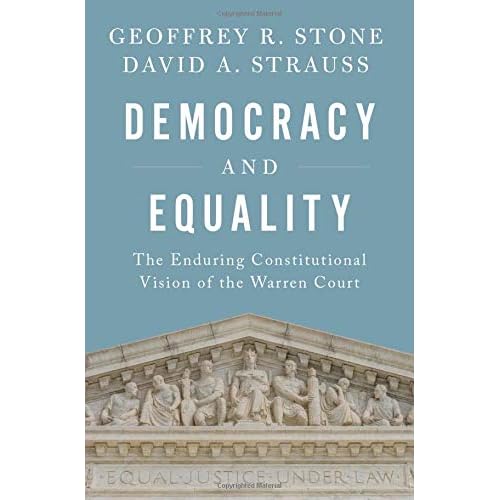Book Details Title: Democracy and Equality: The Enduring Constitutional Vision of the Warren Court (Inalienable Rights) | |
Book DescriptionReview “A full-throated, lucid, and utterly persuasive defense of the Warren Court and the constitutional principles it established: equality, liberty, dignity, and democracy. Stone and Strauss remind us of what constitutional law does at its best.” — David Cole, National Legal Director, ACLU, and author of Engines of Liberty“Most of what we think about with respect to the Warren Court comes in the size and shapes of legal cartoons. Even some serious scholars on the right and left dismiss the landmark cases that emerged from that court as the work of unmoored ideologues, legislating from the bench. In this eminently readable book, Geoffrey Stone and David Strauss, offer up a primer on the craft and methodology of the jurists who gave us the scaffolding of today’s desegregation, criminal justice, voting rights and free speech landscape. They prove that these signal achievements were not rooted in fanciful ideas; they are the very constitutional air we breathe, and they are under threat, now as never before. Only through this sober and deeply researched understanding of what the Warren Court did and how it was done, can we continue to fight for the vision of equality and fairness that it put into practice.”–Dahlia Lithwick, Senior Legal Editor, Slate“In a time when it has become all too fashionable to treat the work of the Warren Court as having diminishing relevance-and to treat that era’s legal doctrines as reflecting an unduly ambitious view of the role courts can play in securing justice and protecting representative government-Democracy and Equality offers a breath of fresh air. This eminently readable narrative brilliantly illuminates the possibilities still latent in our founding document by focusing on a dozen great controversies that the Court under Earl Warren resolved in a humane and progressive way while remaining faithful to the aspirations underlying our founding and animating the rebirth of the republic.”–Laurence H. Tribe, Carl M. Loeb University Professor and Professor of Constitutional Law, Harvard Law School”In this wonderfully accessible book, Stone and Strauss take on the perennial claim that the Warren Court represents judicial ‘activism’ run amok. As they convincingly argue, although the Warren Court completely transformed the American legal landscape, it did so in ways that were entirely consistent with the logic and values of the Constitution and democratic society. Today, as we struggle to realize ‘a more perfect Union,’ Strauss and Stone’s powerful insights are both urgent and invaluable.”–Melissa Murray, Frederick I. and Grace Stokes Professor of Law, NYU School of Law”A clear and very useful primer for the lay audience, but it is also informative and provocative for the seasoned constitutional lawyer… This is an important and interesting book for all of us.”–Law360“An excellent book… a worthy addition to those works that have explored the Supreme Court’s history and impact on our country.”–Chicago Daily Law Bulletin “Engaging and enlightening.”–The American Prospect Read more About the Author Geoffrey R. Stone is the Edward H. Levi Distinguished Service Professor at the University of Chicago. He has served as Dean of the University of Chicago Law School and as Provost of the University of Chicago, and is the author of many books on constitutional law, including Sex and the Constitution and Perilous Times.David A. Strauss is the Gerald Ratner Distinguished Service Professor of Law and the Faculty Director of the Supreme Court and Appellate Clinic at the University of Chicago. He is the author of many important articles on constitutional law and of the influential book The Living Constitution. Read more Customers Review:The authors wrote this book to commemorate and reflect back on the Warren Court. Earl Warren served as Chief Justice of the Supreme Court of the United States from 1953 to 1969. 2019 was the 50th anniversary of Warren’s retirement. In this book, as David Cole noted in a cover jacket blurb, Strauss and Stone provide a “persuasive defense of the Warren Court and the constitutional principles it established: equality, liberty, dignity, and democracy.” As the authors argue, the justices on this Court did so while remaining true to he highest responsibilities and principles.The authors consider and reflect on twelve specific decisions handed down by the Warren Court and describe the importance of those decisions and how the Court decisions were well within the role of the judiciary.It is an important reminder of what role the Court can play and how it can be principled and even out the landscape for the powerful and the voiceless. It is a worthy addition to the Constitution scholarship that is out there, and a call subtly to the present Court. | |

